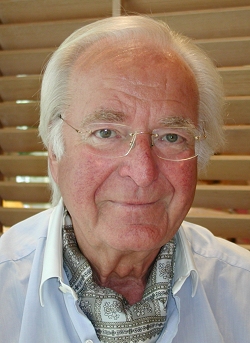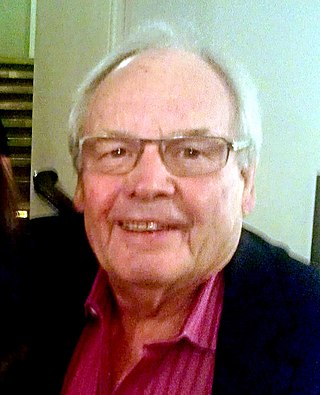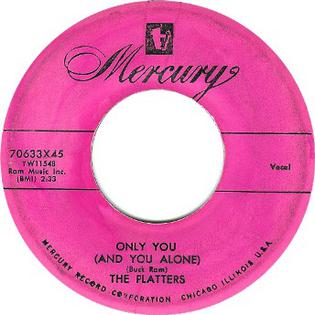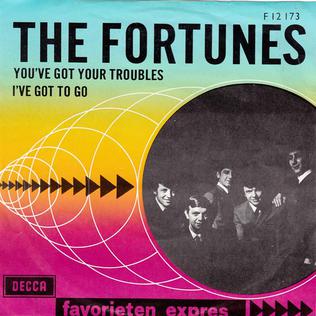
Blue Hawaii is a 1961 American musical romantic comedy drama film directed by Norman Taurog and starring Elvis Presley. The screenplay by Hal Kanter was nominated by the Writers Guild of America in 1962 in the category of Best Written American Musical. The film opened at number two in box-office receipts for that week and, despite mixed reviews from critics, finished as the 10th top-grossing film of 1961 and 14th for 1962 in the Variety national box office survey, earning $5 million. The film won a fourth place prize Laurel Award in the category of Top Musical of 1961.

Martin Böttcher was a German composer, arranger and conductor.

"Downtown" is a song written and produced by English composer Tony Hatch. Its lyrics speak of going to spend time in an urban downtown as a means of escape from everyday life. The 1964 version recorded by British singer Petula Clark became an international hit, reaching number one on the Billboard Hot 100 and number two on the UK Singles Chart. Hatch received the 1981 Ivor Novello award for Best Song Musically and Lyrically.

Anthony Peter Hatch is an English composer for musical theatre and television. He is also a songwriter, pianist, arranger and producer.

"Only You (And You Alone)" (often shortened to "Only You") is a pop song composed by Buck Ram. It was originally recorded by The Platters with lead vocals by Tony Williams in 1955.

"Anyone Who Had a Heart" is a song written by Burt Bacharach (music) and Hal David (lyrics) for Dionne Warwick in 1963. In January 1964, Warwick's original recording hit the Top Ten in the United States, Canada, Spain, Netherlands, South Africa, Belgium and Australia.

"You're My World" is a cover of Italian ballad originally recorded in 1963 as "Il mio mondo" by Umberto Bindi, who co-wrote the original version with Gino Paoli. Subsequently, an English version was commissioned, and the lyrics were written by Carl Sigman as "You're My World". The song reached No. 1 in Australia (twice), Belgium, Mexico, Netherlands, South Africa and United Kingdom in recordings by Cilla Black, Daryl Braithwaite, Guys 'n' Dolls and Helen Reddy. Black's and Reddy's versions reached the US Top 40 in 1964 and 1977, respectively. The song also reached No. 1 in France and Spain in the respective translations "Ce monde" and "Mi Mundo", both sung by Richard Anthony.
"(There's) Always Something There to Remind Me" is a song written by American songwriting duo Burt Bacharach and Hal David. Originally recorded as a demo by Dionne Warwick in 1963, "(There's) Always Something There to Remind Me" first charted for Lou Johnson, whose version reached No. 49 on the Billboard Hot 100 in mid-1964. Sandie Shaw took the song to No. 1 in the UK that same year, while the duo Naked Eyes had a No. 8 hit with the song in the US two decades later in 1983.

"Sweet Leilani" is a song featured in the 1937 film, Waikiki Wedding. It won the Academy Award for Best Original Song, and Bing Crosby's record became one of the biggest hits of 1937.

"You've Got Your Troubles" was the inaugural composition by the prolific songwriting team of Roger Cook and Roger Greenaway in 1964. "You've Got Your Troubles" became a number 2 UK hit for the Fortunes in the United Kingdom in August 1965, affording the group international success including a Top Ten ranking in the US. The track was included on the Fortunes' self-titled 1965 debut album release, the group's only album release of the 1960s.
The Waikikis were a Belgian studio band, mostly known for their single "Hawaii Tattoo", released in the U.S. in 1964, on Kapp Records. "Hawaii Tattoo" was recorded in 1961 in Belgium and spent two months in the Belgian chart. It was a huge hit in Germany, spending 21 weeks in the Top Ten and also reached the Top Fifty in the U.S., Canada and the UK.
Hawaii Calls was a radio program broadcast live from Waikiki Beach from 1935 through 1975 that reached 750 stations world-wide at the height of its popularity. It featured live Hawaiian music by an 11-piece dance orchestra conducted by Harry Owens, the composer of "Sweet Leilani". The show selected the best musicians and singers, with the purpose of showcasing what authentic Hawaiian music is like when played by native performers, but with one major difference—the lyrics were sung in English and intended for white audiences. Hawaiians called this hybrid with English hapa haole (half-white).
"Blue Hawaii" is a popular song written by Leo Robin and Ralph Rainger for the 1937 Paramount Pictures film Waikiki Wedding, starring Bing Crosby and Shirley Ross. Crosby recorded a version with backing by Lani McIntyre and His Hawaiians, which was released in 1937 as the B-side of "Sweet Leilani." This reached the No. 5 spot in the charts of the day during a 13-week-stay
Horst Jankowski was a classically trained German pianist, most famous for his internationally successful easy listening music.
"Concrete and Clay" is a 1965 hit single recorded by the UK pop group Unit 4 + 2. It reached No. 1 on the UK Singles Chart in April 1965. The song was written by group members Tommy Moeller and Brian Parker. It was also a top 40 hit for Eddie Rambeau in 1965.

Blue Hawaii is the fourth soundtrack album by the American singer Elvis Presley, released on RCA Victor Records in mono and stereo, LPM/LSP 2426, on October 20, 1961. It is the soundtrack to the 1961 film of the same name starring Presley. In the United States, the album spent 20 weeks at the number one slot and 39 weeks in the Top 10 on Billboard's Top Pop LPs chart. It was certified Gold on December 21, 1961, Platinum and 2× Platinum on March 27, 1992, and 3× Platinum on July 30, 2002, by the Recording Industry Association of America. In the UK, the album spent 18 weeks at no. 1 on the Record Retailers (RR) album chart. On the US Top Pop Albums chart, Blue Hawaii is second only to the soundtrack of West Side Story as the most successful soundtrack album of the 1960s.

"We'll Sing in the Sunshine" is a 1964 hit song written and recorded by Gale Garnett which reached No. 2 in Canada, and No. 4 on the U.S. Billboard Hot 100 chart for the week ending 17 October 1964. It also enjoyed success on easy listening and country music radio stations, spending seven weeks at No. 1 on the Billboard Easy Listening chart and No. 42 on the country chart. The Cash Box Top 100 ranked "We'll Sing in the Sunshine" at No. 1 for the week of 31 October 1964, and it also reached No. 1 in Garnett's native New Zealand that November. In Australia, "We'll Sing in the Sunshine" afforded Garnett a Top Ten hit with a No. 10 peak in October 1964. Garnett's sole Top 40 hit, "We'll Sing in the Sunshine" won the Grammy Award for Best Ethnic or Traditional Folk Recording in 1965.
"The House of the Rising Sun" is an American traditional folk song, sometimes called "Rising Sun Blues". It tells of a person's life gone wrong in the city of New Orleans. Many versions also urge a sibling or parents and children to avoid the same fate. The most successful commercial version, recorded in 1964 by the British rock band The Animals, was a number one hit on the UK Singles Chart and in the US and Canada. As a traditional folk song recorded by an electric rock band, it has been described as the "first folk rock hit".
"Wheels" is the debut single by the String-A-Longs, issued in 1960. Their biggest hit single, it peaked at No. 3 on the Billboard Hot 100 and was the number 8 single of 1961 according to Billboard. The track reached number 8 in the UK Singles Chart. It sold over one million copies, and was awarded a gold disc.

"(Just Like) Romeo and Juliet" is a song written by Bob Hamilton and Freddie Gorman, first made famous by the 1964 hit recording by the Reflections. The song is the first person narrative of a young man who plans to find a job so that he can buy his girlfriend presents and a car to take her out on dates. He fears that if he fails to find gainful employ, their love will fall apart, a situation he likens to the famous tragedy Romeo and Juliet.











